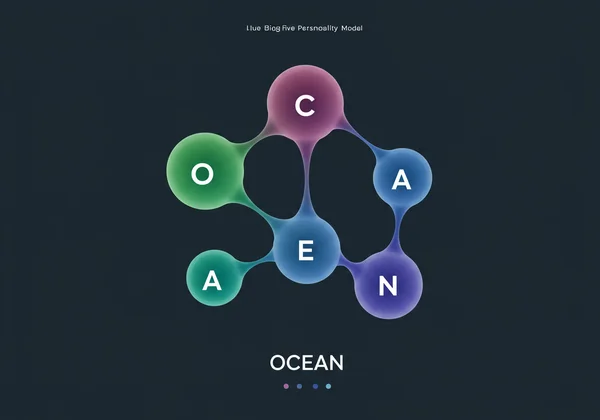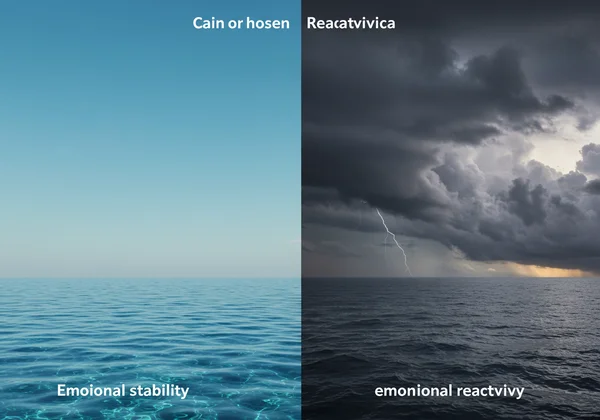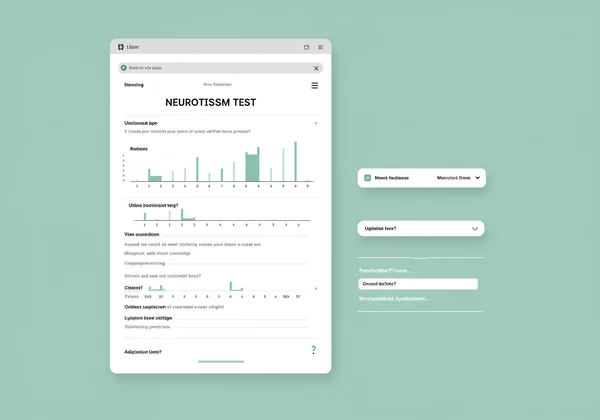Neuroticism Test in Big Five: Understanding Your Personality Traits
August 26, 2025 | By Alicia Campos
Have you ever wondered what makes you, you? For centuries, people have sought to understand the architecture of human personality. Modern psychology offers a powerful, scientifically validated map for this journey of self-discovery: the Big Five personality model. By understanding this framework, you can gain profound insights into your emotional patterns and behaviors. At the heart of this exploration is the neuroticism test, a tool designed to measure your emotional stability. So, what is a neuroticism test and how can it illuminate your inner world?
This guide will break down the Big Five model and take a deep dive into neuroticism. We'll explore what high and low scores mean and how this single trait interacts with the rest of your personality. If you're ready to move from curiosity to clarity, you can start your free test today and uncover the science behind your personality.
Understanding the Big Five Personality Model (OCEAN)
When psychologists talk about personality, they often refer to the Big Five model, also known as OCEAN. This isn't just another online trend; it's one of the most respected and widely used models in personality psychology. It proposes that human personality can be described along five broad dimensions, providing a comprehensive yet easy-to-understand profile. A good big five neuroticism test is grounded in this robust scientific foundation.
The OCEAN acronym stands for:
-
Openness to Experience
-
Conscientiousness
-
Extraversion
-
Agreeableness
-
Neuroticism

Each trait exists on a spectrum, and your unique personality is a blend of where you fall on each of these five scales. This model avoids rigid boxes, instead celebrating the nuanced and dynamic nature of who we are.
What are the Core Five Traits?
To appreciate the role of neuroticism, it helps to understand its counterparts. What are the big 5 traits in more detail? Let's briefly define each one:
- Openness to Experience: This trait reflects your imagination and creativity. High scorers are often curious, adventurous, and open to new ideas, while low scorers prefer routine and familiarity.
- Conscientiousness: This dimension relates to self-discipline and organization. Highly conscientious individuals are typically detail-oriented, responsible, and reliable. Those on the lower end tend to be more spontaneous and flexible.
- Extraversion: This trait is characterized by sociability and assertiveness. Extraverts draw energy from social interaction, whereas introverts (low on extraversion) recharge through solitude.
- Agreeableness: This reflects your tendency to be cooperative and compassionate. High scorers are often kind, trusting, and helpful. Low scorers may be more competitive and skeptical.
- Neuroticism: This dimension measures emotional stability versus emotional reactivity. It gauges your tendency to experience negative emotions like anxiety, worry, and sadness.
Why the Big Five Model Matters for Self-Insight
The Big Five model is more than an academic exercise; it's a practical tool for personal growth. Because it is based on extensive research across different cultures and demographics, its insights are reliable and meaningful. Understanding your profile can help you identify your natural strengths, recognize potential challenges, and improve your relationships with others.
By learning where you stand, especially on the neuroticism scale, you can develop strategies to manage stress, navigate social situations, and make career choices that align with your innate temperament. It provides a language to describe your inner experiences, turning vague feelings into actionable insights. Are you curious about your personality profile? You can discover your results on our platform.
Neuroticism: A Deep Dive into Emotional Stability
Now, let's zoom in on the 'N' in OCEAN: Neuroticism. This trait is fundamentally about emotional sensitivity and your response to stress. It's often misunderstood and unfairly stigmatized, but it's a normal and essential part of the human personality spectrum. Taking an emotional stability test is simply a way to measure where you fall on this continuum.

Individuals high in neuroticism tend to experience more emotional ups and downs, while those low in neuroticism are generally more calm and resilient. Neither end of the spectrum is inherently "good" or "bad." Both have unique advantages and challenges. A person with high neuroticism might be more attuned to potential threats, while a person with low neuroticism may remain level-headed in a crisis.
Defining High Neuroticism: Traits and Tendencies
Taking a high neuroticism test and receiving a high score simply means you are more emotionally reactive. What does a high neuroticism score mean in daily life? People with this trait often report:
- Frequent Worrying: A tendency to ruminate on potential problems and focus on the negative.
- Anxiety: Feeling tense, nervous, or unable to relax, even in non-threatening situations.
- Mood Swings: Experiencing shifts in emotion more readily and intensely than others.
- Self-Doubt: A critical inner voice that can lead to feelings of inadequacy or insecurity.
- Sensitivity to Stress: Finding it difficult to cope with pressure and becoming easily overwhelmed.
While these tendencies can be challenging, they can also fuel creativity, empathy, and a deep sense of self-awareness. Recognizing these patterns is the first step toward managing them effectively.
Exploring Low Neuroticism: Resilience and Calmness
On the other side of the spectrum is low neuroticism, which is synonymous with high emotional stability. A low neuroticism score suggests a resilient and even-keeled temperament. What does low neuroticism look like? Common characteristics include:
-
Emotional Stability: Maintaining a calm and balanced emotional state, even under pressure.
-
Resilience: Bouncing back quickly from setbacks and disappointments.
-
Confidence: A general sense of security and self-assurance.
-
Less Worry: A more relaxed approach to life, with less time spent on anxious thoughts.

While emotional stability is often seen as a desirable trait, individuals very low in neuroticism might sometimes be less attuned to risks or appear detached from the emotional experiences of others. Understanding your score on a test for neuroticism can provide clarity.
The Interplay: Neuroticism & Other Big Five Traits
Your personality isn't just a collection of five separate scores; it's a dynamic interplay between them. Neuroticism, in particular, can color how your other traits are expressed. This interaction creates the rich complexity that makes you a unique individual.
For example, someone high in both Neuroticism and Conscientiousness might be an "anxious achiever"—highly driven and successful, but also prone to burnout and perfectionism. Conversely, a person high in Neuroticism but low in Agreeableness might come across as irritable and critical. Exploring these combinations reveals a much deeper and more accurate picture of your personality.
How Neuroticism Shapes Your Overall Personality Profile
Consider how neuroticism interacts with extraversion. An extravert with high neuroticism might be socially outgoing but also highly sensitive to social rejection or criticism. An introvert with low neuroticism might be quiet and reserved but also deeply secure and content in their own company. Each combination produces a distinct personality style, with its own set of strengths to leverage and challenges to navigate.
How Our Neuroticism Test Reflects the Big Five
Understanding the theory is one thing, but applying it to your own life is where the real value lies. Our free personality test neuroticism is carefully designed to align with the principles of the Big Five model, providing you with a reliable and insightful measure of your emotional stability.
We believe that self-knowledge should be accessible, which is why we offer a scientifically grounded tool to help you on your journey. Our test isn't about labeling you; it's about empowering you with information.
Our Science-Backed Approach to Your Results

Our neuroticism assessment is built upon the established research that validates the Big Five framework. The questions are formulated to accurately gauge your tendencies toward emotional reactivity and resilience. When you take our test, you aren't answering a random quiz; you are engaging with a tool rooted in decades of psychological science. We are committed to providing a trustworthy experience that respects the complexity of your personality.
Beyond the Score: Personalized Insights for Growth
Receiving a score is just the beginning. True growth comes from understanding what that score means for you and how to use that knowledge. That's why we offer an optional, AI-powered deep analysis report. This personalized report goes beyond the numbers to provide:
- Scenario-Based Analysis: See how your neuroticism level might play out in real-life situations.
- Strengths and Challenges: Discover the unique advantages and potential pitfalls of your score.
- Actionable Advice: Get practical, tailored suggestions for managing your emotions and building resilience.
This in-depth feedback transforms your test result into a roadmap for personal development. You can unlock your AI report after completing the initial free test.
Your Path to Self-Discovery Through Personality Insights
Understanding your personality through the lens of the Big Five model is a powerful step toward a more self-aware and fulfilling life. Neuroticism, as a core dimension of this model, holds vital clues to your emotional landscape, stress responses, and overall well-being. By embracing this knowledge without judgment, you can learn to work with your natural tendencies, harnessing your strengths and managing your challenges.
The journey to "know yourself" begins with a single, informed step. Are you ready to take it? Visit our homepage to take the free, science-based Neuroticism Test and start your journey of self-discovery today.
Frequently Asked Questions About Neuroticism & Personality Tests
What are the Big Five personality traits?
The Big Five, or OCEAN model, includes five core personality dimensions: Openness, Conscientiousness, Extraversion, Agreeableness, and Neuroticism. These traits represent a spectrum, and together they provide a comprehensive profile of an individual's personality. They are widely considered the gold standard in personality psychology.
Is neuroticism just anxiety or something more?
While anxiety is a key component of high neuroticism, the trait is broader. Neuroticism encompasses a general tendency to experience a range of negative emotions, including worry, sadness, moodiness, and self-doubt. It reflects a person's overall emotional stability and reactivity to stress, not just their level of anxiety. An am i neurotic test can help clarify your specific patterns.
How is neuroticism typically tested in psychology?
In psychology, neuroticism is most commonly measured using self-report questionnaires. These assessments, like the one offered on our site, present a series of statements about feelings, thoughts, and behaviors. Individuals rate how well each statement describes them, and their combined responses generate a score that places them on the neuroticism spectrum. This method is reliable, efficient, and scientifically validated for assessing personality traits.